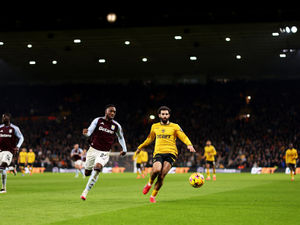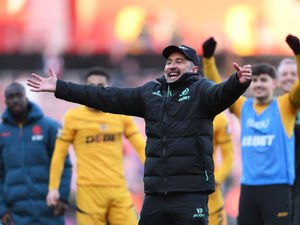Johnny Phillips: Toto’s fairytale journey helped light up Italia 90
One of the many bright lights of the 1990 World Cup went out this week.
While the football did not always live up to expectations, the tournament will rightly be fondly remembered for the incredible storylines and characters which made such a lasting mark.
Gazza’s tears, Roger Milla’s dancing as Cameroon slayed their more illustrious opponents, Jackie Charlton’s Green and White Army on their first World Cup adventure, the last hurrahs for names like West Germany, Yugoslavia, Czechoslovakia and USSR as the Iron Curtain fell, the soundtrack of Nessun Dorma and so much more.
It felt as if football and the world changed forever after Italia 90.
There were great players captaining their countries in search of the ultimate prize: Lothar Mattheus, Ruud Gullit, Diego Maradona, Dragan Stojkovic.
And of those unknown upstarts who broke through, it was not just Paul Gascoigne who announced himself on the greatest stage of all. There was Roberto Baggio, Robert Prosinecki, Claudio Caniggia and, of course, Salvatore Schillaci.
How could we forget the wide-eyed ecstasy of ‘Toto’, the celebrating striker who had only won his first cap for Italy three months earlier? A man who had crept into the finals through the back door and left as a national hero with the Golden Boot.
Schillaci was 25 when he made his debut for Azeglo Vicini’s side in March that year, his only cap before the tournament. Expected to be a peripheral figure, a squad player unlikely to make it onto the pitch for more than a couple of minutes during the whole tournament, the man from Sicily seized his chance.
As first choice strikers Gianluca Vialli and Andrea Carnevale toiled in their efforts to break down a resilient Austrian team in their opening game, Vicini sent on Schillaci from the substitutes’ bench in the 76th minute to try to find a way through.
Sure enough, just two minutes later, a thumping header won the game. It was his first touch at the World Cup. But it was what followed that captured the imagination.
Arms out-stretched, fists pumping and eyes popping out of his head, Schillaci raced away in manic celebrations not dissimilar to those of his compatriot Marco Tardelli eight years earlier in the 1982 World Cup final. A whole nation celebrated alongside Schillaci and a hero was born.
He did not the start the next game against the USA, despite the local media urging Vicini to use him from the first whistle.
Schillaci was eventually given a place in the first XI against Czechoslovakia alongside a player who had remained on the bench for the opening two games – Baggio. Both scored and cemented their place in the Azzurri for the knockout stages, usurping the established front two of Vialli and Carnevale.
With this new-look attack taking the host nation past Uruguay and Republic of Ireland, Italy eventually succumbed to penalties in the semi-final against Argentina.
Schillaci’s final goal of the tournament came in the third-place play-off against Bobby Robson’s England. With six goals, he beat Czechoslovakia’s Tomas Skuhravy to the Golden Boot.
Yet Schillaci’s star dimmed almost as soon as it had come to light.
After the World Cup he scored just one more goal for Italy, taking his total to seven in 16 appearances.
Italy failed to qualify for the European Championship two years later, and Schillaci had long disappeared from the international stage by the time of the next World Cup in the USA.
Still only 29, his Italian club career had fizzled out too. After leaving Juventus and Inter Milan, he wound up at
Japanese side Jubilo Iwata, where he stayed for three years, helping them to the J League title in 1997.
His country never forgot, though.
Schillaci’s name is revered in his homeland. In 2004 he came third in a reality television series L’isola dei Famosi. He also took a role as a mafia heavy in a tv series before later becoming a pundit on a Sunday football show.
Everybody loves a rags to riches tale. Schillaci was born into poverty in Palermo. He spent little time at school and was working by the age of 11, delivering supplies to the bar where his grandfather worked and helping the local milkman on his rounds.
Grafting for every lira he could find, nobody could have imagined the career path that followed. Schillaci stayed true to his roots, opening a football academy in Palermo.
His death at the age of 59 has taken away one of the game’s great characters, whose legacy in his homeland was forged in those glorious few weeks of Italia 90.




